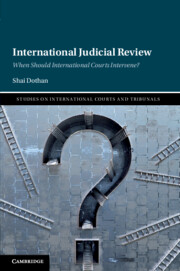Book contents
- International Judicial Review
- Studies on International Courts and Tribunals
- International Judicial Review
- Copyright page
- Dedication
- Contents
- Acknowledgments
- 1 Introduction
- 2 The Argument from Normative Legitimacy
- 3 The Argument from Systemic Epistemic Superiority
- 4 Why International Courts Improve Deliberation
- 5 Who Should Participate in the Courts’ Proceedings?
- 6 Creating the Right Incentives
- 7 Conclusions
- Bibliography
- Index
4 - Why International Courts Improve Deliberation
Published online by Cambridge University Press: 14 February 2020
- International Judicial Review
- Studies on International Courts and Tribunals
- International Judicial Review
- Copyright page
- Dedication
- Contents
- Acknowledgments
- 1 Introduction
- 2 The Argument from Normative Legitimacy
- 3 The Argument from Systemic Epistemic Superiority
- 4 Why International Courts Improve Deliberation
- 5 Who Should Participate in the Courts’ Proceedings?
- 6 Creating the Right Incentives
- 7 Conclusions
- Bibliography
- Index
Summary
Chapter 4 replies to the argument that international courts who decide important policy decisions take them off the public agenda and therefore stifle public debate. The chapter explains that an international judgment is often just the entry point into a public discussion and a dialogue with the relevant authorities. In fact, the ensuing public deliberation may be superior to what would happen absent international courts' intervention. International courts shift the discussion from interests and naked power to rights, and they change the social settings in a way that processes and disseminates information well to wider segments of the public. International courts create friction with the executive, guide the legislator, and can help the national judiciary, all leading to a more vibrant debate. Finally, international courts provide numerous lawyers with vital training that they can use to better the public discourse.
Keywords
- Type
- Chapter
- Information
- International Judicial ReviewWhen Should International Courts Intervene?, pp. 67 - 84Publisher: Cambridge University PressPrint publication year: 2020

